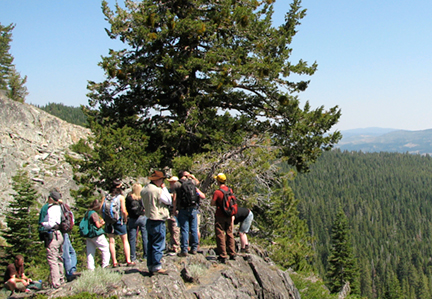Integrative Biology
Coordinator: Dr. Robert Boria
The Masters in Biology with a Concentration in Integrative Biology is designed for students aiming to go on to Ph.D. programs or enter the workplace in fields such as systematics, evolutionary biology, conservation biology, population genetics, genomics, taxonomy, biodiversity, and biogeography and/or community, population, reproductive, physiological, and evolutionary ecology. This program is a research-intensive program – students conduct hands-on mentored research training using state-of-the-art facilities with the goal of publishing in scientific journals. It is common for students to travel to scientific meetings and present the results of their research in talks or posters. Students work closely on their research projects with their primary advisor in consultation with their chosen thesis/project committee, which consists of two other faculty members.
This concentration is designed for students aiming to go on to Ph.D. programs or enter the workplace in fields such as systematics, evolution, conservation, population genetics, genomics, behavior of organisms; community, population, reproductive, physiological and evolutionary ecology; taxonomy, biodiversity and biogeography. Each faculty member serves as advisor and major professor for students working on research programs in the faculty member's area of specialization. With their advisor, students plan a program of courses that will meet their individual goals and academic or professional interests. For additional details, contact the individual faculty of interest to you.
Faculty
- Katharyn Boyer - Wetland and coastal ecology and restoration, community ecology, biodiversity and ecosystem functioning, nutrient dynamics, trophic interactions, habitat structure.
- Jason Cantley - Botany, Evolution, Biogeography, Population Genetics, Conservation Genetics, New Species Description and Molecular Systematics
- Edward Carpenter; Microbial ecology
- Jaime Chaves - Evolution, Phylogenetics, Phylogeography, Ornithology, Galápagos, Darwin's finches
- C. Sarah Cohen - Population biology and genetics, molecular evolution of marine animals and plants. Evolution of recognition systems in colonial invertebrates and vertebrates.
- Karen Crow-Sanchez - Evolution and ecology of fishes, Ichthyology, Molecular evolution of duplicate Hox genes, Evolutionary Developmental Biology (Evo-Devo)
- Jenna Ekwealor - plant ecology, evolution and physiology
- Megumi Fuse - Insect Endocrinology and Neurobiology, Nociception (Fuse Lab)
- Gretchen LeBuhn
- Mitzy Porras - Global Change Biology, Physiological Ecology, Behavioral Ecology
- Scott Roy - Bioinformatics, Molecular Evolution
- Ravinder Sehgal - Avian Parasitology, Ecology of Infectious Disease
- Kevin Simonin - Plant physiological ecology, stable isotope biogeochemistry
- Andrea Swei - Vector-borne disease, microbiomes, climate change, and disease ecology
- Jadelys Tonos - Mutualisms, frugivory and seed dispersal, movement ecology, data science, primates, tropical ecology
- José R. de la Torre - Microbial Ecology & Evolution, Comparative & Functional Genomics, Microbiome Analysis, Metagenomics, Biogeochemistry, Geobiology
- Vance T Vredenburg - Amphibian Disease Physiology, Disease Ecology (Vredenburg Lab)
- Andy Zink - Social behavior, Mating Systems, Disease Ecology (Zink Lab)
Affiliate Faculty
California Academy of Sciences Research Professors
- Rebecca Albright, Invertebrate Zoology, Research Focus: Corals
- Rayna Bell, Herpetology, Research Focus: Amphibians and Reptiles
- Shannon Bennett, Microbiology, Research Focus: Virology
- Pim Bongaerts, Invertebrate Zoology, Research Focus: Mesophotic corals
- Jack Dumbacher, Ornithology & Mammology, Research Focus: Aves; (Jack Dumbacher Website)
- Flavia Esteves, Phd in ant systematics and evolution, is a research scientist in Entomology
- Brian Fisher, Entomology; Research Focus: Myrmecology
- Terrence Gosliner; Invertebrate Zoology, Research Focus: Malacology
- Alison Gould; Ichthyology, Research Focus: Marine Bioluminescence (Alison Gould Website)
- Sarah Jacobs; Botany; Research Focus: Plant speciation and systematics
- Rebecca Johnson; Biodiversity & Community Science; Research Focus: Biodiversity and Community Science
- Durrell Kapan; Entomology/O&M; Research Focus: Conservation Genomics (Xerces), Biodiversity & Resilience (Sierra Forests)
- Athena Lam, PhD in Environmental Sciences from UC Berkeley, is a research scientist and Director of our Center for Comparative Genomics
- Elora Lopez-Nandam; Invertebrate Zoology; Research Focus: Evolution of resilience (Elora Lopez-Nandam Website)
- Richard Mooi; Invertebrate Zoology; Research Focus: Echinoidea (extant & fossil), deep-sea biodiversity
- Luiz Rocha; Ichthyology; Research Focus: Mesophotic reef fishes
- Peter Roopnarine; Geology; Research Focus: Mesophotic reef fishes
- Bart Shepherd; Ichthyology; Research Focus: Aquatic biology
- Brian Simison; Genomics; Research Focus: Genomics, Phylogenetics
- Michelle Trautwein; Entomology; Research Focus: Diptera
- Shannon Tushingham; Anthropology; Research Focus: Anthropological archaeology, niche construction & cultural evolution
- Matt Van Dam; Entomology; Research Focus: Curculionidae, Systematics, Genomics
- Gary Williams; Invertebrate Zoology; Research Focus: Octocoral Systematics, Deep-Sea Biology
Estuarine & Ocean Sciences Center (EOS) Faculty
- Roger Bland; Underwater acoustics
- Andy Chang; Marine invasions and intertidal ecology
- Richard Dugdale; Biological oceanography and biogeochemical cycling
- Matt Ferner; Marine benthic ecology
- Julie Gonzalez; Applied coastal ecology and socioecological integration
- Ellen Hines; Marine and coastal GIS and marine endangered species
- Jaime Jahncke; Biological Oceanography, Marine Ecology
- Sean Jungbluth; Environmental genomics and systems biology
- Michelle Jungbluth; Biological oceanography and molecular biology
- Wim Kimmerer; Biological oceanography
- Tomoko Komada; Marine biogeochemistry
- Stuart Siegel; Wetland geography and spatial planning
- Anne Simonis; Acoustic ecology
- Frances Wilkerson; Marine biology and biological oceanography
- Chela Zabin; Coastal ecology and restoration
